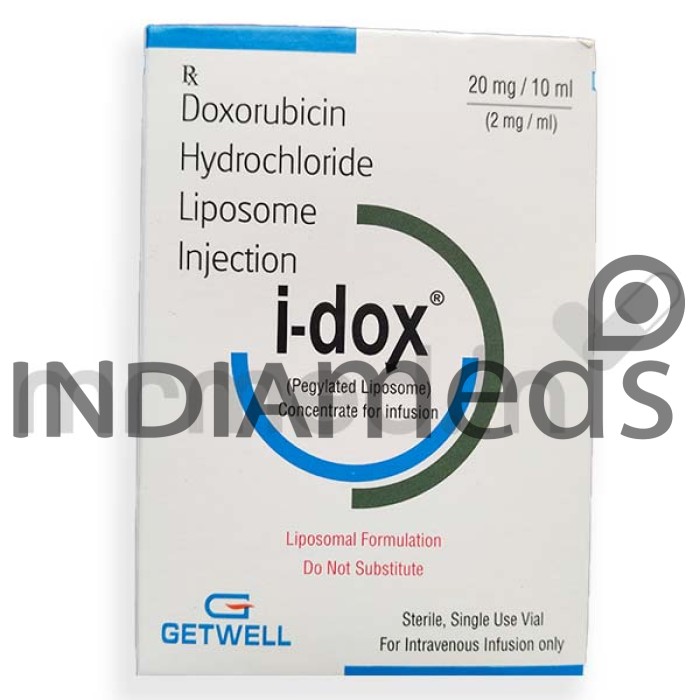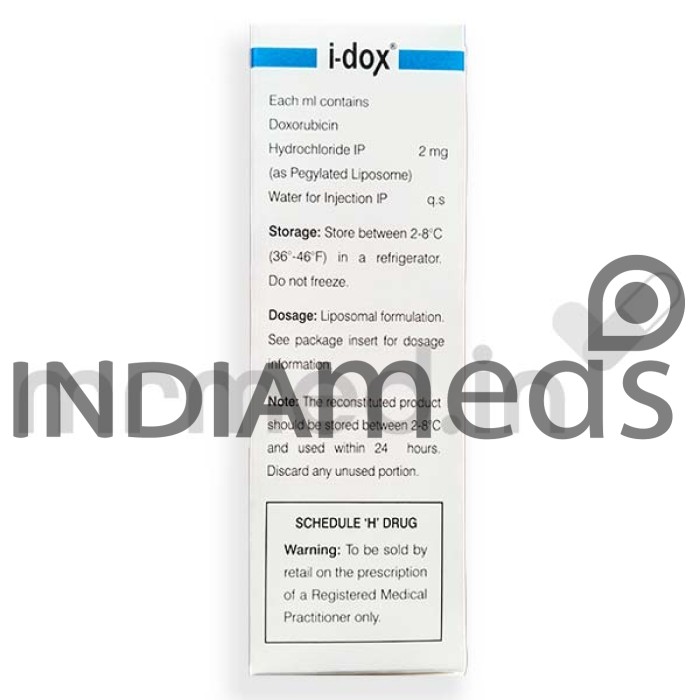I-Dox 20mg Injection is an anticancer medication that contains the active constituent doxorubicin encapsulated in a closed lipid sphere (liposome). Cancer is a disease in which cells multiply in an uncontrolled and abnormal manner. This medication treats breast cancer, ovarian cancer, multiple myeloma (cancer of white blood cells called plasma cells), and AIDS-related Kaposi’s sarcoma.
People with HIV infection have the highest risk of Kaposi’s sarcoma (cancer that forms in the lining of the lymph and blood vessels). I-Dox 20mg Injection may be given alone or in combination with other anticancer medicines. This medication is not recommended for adolescents and children.
Use effective birth control during the treatment and at least six months after the last dose. It is important to tell your doctor if you are allergic to peanuts or soya if you are receiving medicines for heart or liver disorders, has diabetes, Kaposi’s sarcoma, or have oral problems before taking I-Dox 20mg Injection.
Therapeutic Effects of I-dox 20mg Injection
The unique formulation process of I-Dox 20mg Injection increases the time this medicine is circulating in the blood. It also helps deliver drugs from blood to the cancerous tissue rather than the healthy tissue.
Pregnancy
I-Dox 20mg Injection may harm the unborn baby. You need to tell your physician if you are pregnant or planning to get pregnant before taking this medicine.
Breast Feeding
Stop breastfeeding before starting treatment with I-Dox 20mg Injection. You need to tell your physician if you are breastfeeding before taking this medicine.
Lungs
It is unknown whether I-Dox 20mg Injection can be given to patients with lung diseases. Please consult your physician if you have any lung problems.
Liver
You need to tell your physician if you have any liver disorders before taking I-Dox 20mg Injection.
Alcohol
It is not known whether it is safe to consume alcohol with I-Dox 20mg Injection. Please consult your doctor.
Driving
I-Dox 20mg Injection may cause tiredness or sleepiness. Avoid driving if you are unwell. Please consult your doctor for more advice.
Serious:
- Fever, tiredness, bruising or bleeding
- Severe diarrhea, sores in mouth, nausea, vomiting
- Lung infections, shortness of breath
- Severe stomach pain
- Severe weakness
Common:
- Low blood cell counts
- Hair loss
- Decreased appetite
- Skin rashes
- Pain in the muscles and joints
- Constipation
- Feeling confused, difficulty sleeping
- Headache, dizziness, sleepiness
- Change in taste
- High or low blood pressure
- Excessive sweating
- Pain when passing urine
- Weight loss
- Muscle spasms
- Fast heartbeat
This medication is used to treat breast cancer, ovarian cancer, multiple myeloma (cancer of white blood cells called plasma cells) and AIDS-related Kaposi’s sarcoma.
No, it is unsafe to use this medication while driving and handling heavy machineries as it causes lack of concentration and alertness.
It damages the genetic material (DNA) of the cancer cells and stops their growth and multiplication
The common side effects of these medications are nausea, vomiting, rash, weakness, low blood platelets, Fatigue, Fever, Loss of appetite, Anemia, and Constipation.
It is unsafe to use this medication in patients planning for pregnancy or during pregnancy and breastfeeding mothers as it causes harmful effects for the baby.
| Molecule Name: Liposomal Doxorubicin | Therapeutic effects: Antineoplastics |
| Pharmacological class: Anthracyclines | Indications: 1. Breast cancer 2. Ovarian cancer 3. Multiple myeloma 4. AIDS-related Kaposi’s sarcoma |





